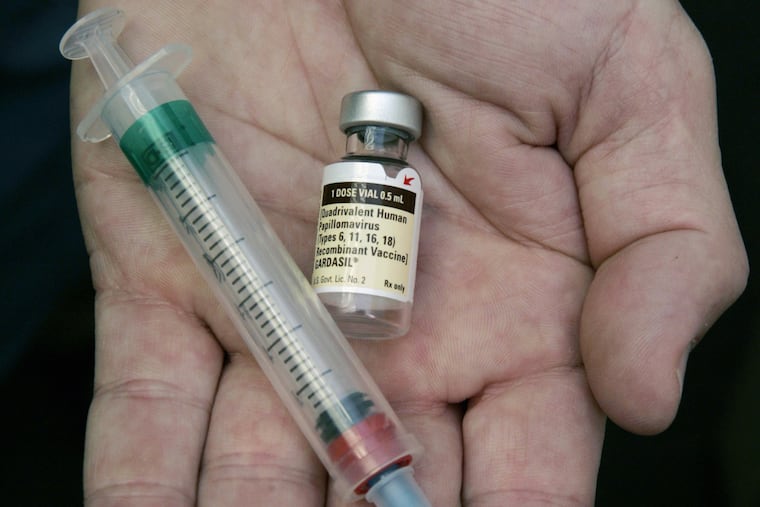HPV cancers are increasing, while preventive vaccine is underused, CDC data find
This week, the CDC reports some sobering trends in HPV-related cancers — and in the uptake of the vaccine that could prevent future cancers.

Almost all HPV-related cancers are increasing in the United States, yet the vaccine with the potential to nearly wipe out these malignancies in future generations remains underused.
That's the picture that emerges from federal data published Thursday by the U.S. Centers for Disease Control and Prevention in its Morbidity and Mortality Weekly Report.
The human papillomavirus, or HPV, is a big family of sexually transmitted viruses that live in cells on the surface of the cervix, vagina, anus, vulva, penis, mouth, and throat. Several high-risk strains can initiate cancer.
The new CDC data show that between 1999 and 2016, cervical cancer rates have fallen, continuing a decades-long decline due to screening programs. But other HPV-related cancers — for which there are no early-detection methods — have increased during the 17-year period.
In particular, oral cancer has exploded among men and has eclipsed cervical cancer as the most common HPV-related malignancy. About 15,400 men were diagnosed with oral cancer last year, compared with 3,438 women. At the same time, anal cancer has risen sharply among women; about 4,500 were diagnosed last year, compared with 2,200 men.
The CDC report also tracks the continuing unpopularity of the HPV vaccine, which is recommended to be given to boys and girls at age 11 or 12, before they come in contact with the virus. Last year, 44 percent of 13-year-old girls, and 34 percent of 13-year-old boys, were fully vaccinated.
Among all adolescents ages 13 to 17, just under half were immunized last year. While the rate has been inching up since the vaccine was introduced in 2006, it is far lower than for other childhood vaccines.
Patti Gravitt, an HPV researcher at George Washington University, said the cancer trends are the fallout of changes in sexual norms that go back to the so-called Sexual Revolution.
HPV cancers are multiplying "due to dramatic increases in the number of pre-marital sexual partners that occurred in the 1960s and 1970s," she said.
Because an HPV infection may take decades to progress to cancer "we are just now seeing these behavioral changes manifest as increases in … cancers, especially oral and anal cancers," she said.
Exactly why men are so much more vulnerable to oral cancer than women is unclear, but recent research points to differences in the male immune response. Compared with women, men are more likely to get infected with HPV, less able to wipe out infection, and more likely to get reinfected.
Michael Becker of Yardley, a 49-year-old former biotech executive with terminal oral cancer that began in a tonsil, has stepped up as the face of this alarming phenomenon — and as a champion of the HPV vaccine.
In a recent blog post titled "A passionate plea to parents of preteens," Becker urged adults not to be misled by vaccine opponents who claim the HPV shots are risky, despite a stellar safety record built on 270 million doses given worldwide.
"Had the HPV vaccine been available when I was a preteen, I could have been spared a terminal disease and numerous toxicities of cancer treatment," wrote Becker, whose metastatic cancer was diagnosed in December 2015. "Parents, I beg you — please vaccinate your children against HPV."
Studies have found that parents are highly likely to do just that if pediatricians wholeheartedly recommend the vaccine. In Philadelphia — long a standout in childhood immunization rates — the HPV vaccine has been aggressively promoted both to doctors and parents through educational and other campaigns.
The CDC report includes the result: About 70 percent of Philadelphia adolescents were immunized against HPV last year, compared with 50 percent in the rest of Pennsylvania.
"The most important message is that this vaccine prevents an infection we are all at risk for, and it prevents cancer," said Children's Hospital of Philadelphia pediatrician Kristen A. Feemster, who directs the city's immunization program.
The implications of those facts are profound, said Gravitt, at George Washington.
The increase in HPV-related cancers "can be reversed to near eradication within the next 40 years by accelerating vaccination of U.S. adolescent boys and girls," she said.